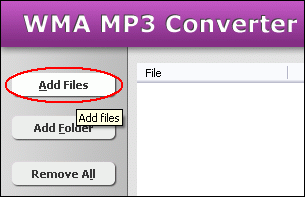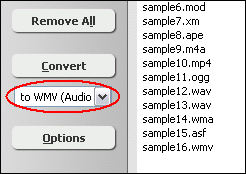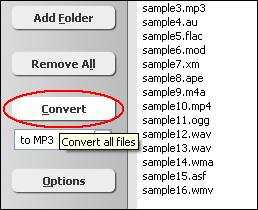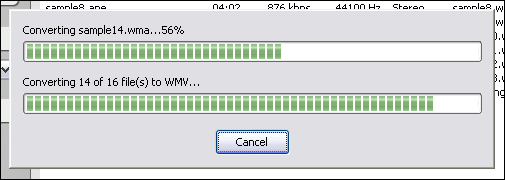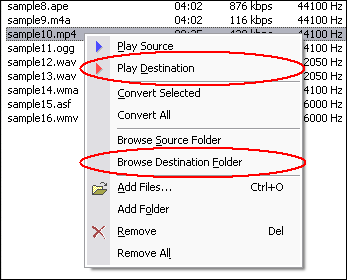WMA to WMVConvert WMA to WMV, WMA to WMV Converter |
 |
| Home | Getting Started | Download | Buy Now! | Screen Shots | FAQ | Support | Contact |
WMA to WMV Converter converts WMA to WMV. The software is an ALL-IN-ONE audio converter that supports more than 100 audio and video files. WMA to WMV Converter supports batch conversion and, is full compatible with Vista and Windows 7.
What is WMA? A WMA file is in most circumstances encapsulated, or contained, in the Advanced Systems Format (ASF) container format, featuring a single audio track in one of following codecs: WMA, WMA Pro, WMA Lossless, or WMA Voice. These codecs are technically distinct and mutually incompatible. The ASF container format specifies how metadata about the file is to be encoded, similar to the ID3 tags used by MP3 files. Metadata may include song name, track number, artist name, and also audio normalization values. What is WMV? A WMV file is in most circumstances encapsulated in the Advanced Systems Format (ASF) container format. The file extension .WMV typically describes ASF files that use Windows Media Video codecs. The audio codec used in conjunction with Windows Media Video is typically some version of Windows Media Audio, or in rarer cases, the deprecated Sipro ACELP.net audio codec. Microsoft recommends that ASF files containing non-Windows Media codecs use the generic .ASF file extension. The ASF container can optionally support digital rights management using a combination of elliptic curve cryptography key exchange, DES block cipher, a custom block cipher, RC4 stream cipher and the SHA-1 hashing function. Although WMV is generally packed into the ASF container format, it can also be put into the AVI or Matroska container format. The resulting files have the .AVI and .MKV file extensions, respectively. WMV can be stored in an AVI file when using the WMV 9 Video Compression Manager (VCM) codec implementation. Another common way to store WMV in an AVI file is to use the VirtualDub encoder. Windows Media Video (WMV) is the most recognized video format within the WMV family. Usage of the term WMV often refers to the Microsoft Windows Media Video codec only. Its main competitors are MPEG-4 AVC, AVS, RealVideo, DivX, and Xvid. The first version of the codec, WMV 7, was introduced in 1999, and was built upon Microsoft's implementation of MPEG-4 Part 2. Continued proprietary development led to newer versions of the codec, but the bit stream syntax was not frozen until WMV 9. While all versions of WMV support variable bit rate, average bit rate, and constant bit rate, WMV 9 introduced several important features including native support for interlaced video, non-square pixels, and frame interpolation. WMV 9 also introduced a new profile titled Windows Media Video 9 Professional, which is activated automatically whenever the video resolution exceeds 300,000 pixels (e.g., 528x576, 640x480 or 768x432 and beyond) and the bitrate 1000 kbit/s. It is targeted towards high-definition video content, at resolutions such as 720p and 1080p. Convert WMA to WMV Related Topics: APE to WMV, XM to WMV, AIFC to WMV, MP3 to WMV, CAF to WMV, M2A to WMV, KAR to WMV, MIDI to WMV, AAC to WMV, OGA to WMV, M4B to WMV, MKA to WMV, ALAC to WMV, SND to WMV, MMF to WMV, MTM to WMV, QCP to WMV, FLAC to WMV, DTS to WMV, GSM to WMV, IT to WMV, AIFF to WMV, MPC to WMV, WAVE64 to WMV, OMA to WMV, RAM to WMV, VQF to WMV, AU to WMV, S3M to WMV, MPA to WMV
|
| Home | Getting Started | Download | Buy Now! | Screen Shots | FAQ | Support | Contact | Links |
| Copyright © 2007-2014 Hoo Technologies All rights reserved. Privacy Policy |
